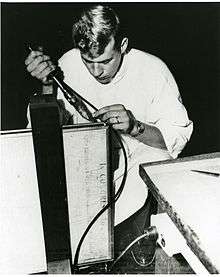Libbey-Owens-Ford

The Libbey-Owens-Ford Company (LOF) was a producer of flat glass for the automotive and building products industries both for original equipment manufacturers and for replacement use. The company's headquarters and main factories were located in Toledo, Ohio, with large float glass plants in Rossford, Ohio, Laurinburg, North Carolina, Ottawa, Illinois, and Lathrop, California. The company was formed by the merger of Libbey-Owens' flat-glass operation with the Edward Ford Plate Glass Company, both located in Toledo, in 1930.[1] [2]
The company's heritage dates back to 1818 with the founding of New England Glass Company of East Cambridge, Massachusetts, which relocated to Toledo, Ohio and in 1892 changed its name to Libbey Glass Company[2] under the direction of Edward Drummond Libbey. In parallel, Michael Owens and associates completed work in 1902 on the first fully functioning automatic bottle-blowing machine (the successor of which was honored as an Historic Mechanical Engineering Landmark by the American Society of Mechanical Engineers), and in 1903 incorporated the Owens Bottle Machine Company. In 1912 Owens acquired rights to Irving Wightman Colburn's invention for manufacturing plate glass.[2]
In June 1916, the Libbey-Owens Sheet Glass Company was organized, and in 1917 the first Libbey-Owens plant opened in Charleston, West Virginia. In 1928, Libbey- Owens was the first company to produce automotive laminated safety glass and won a contract to supply the Ford Motor Company with windshields for the Model A. Libbey-Owens merged with the Edward Ford Plate Glass Company in 1930 to form Libbey-Owens-Ford.[1]
In April 1986, LOF sold its glass business and name to the Pilkington Group, a multinational glass manufacturer headquartered in the United Kingdom. The remaining three business units of the company, Aeroquip, Vickers, and Sterling, were retained and the holding company was renamed TRINOVA Corporation. The Sterling business was later sold and in the late 1990s, the company adopted its two leading business unit names, and continued as Aeroquip-Vickers, Inc., until being absorbed by Eaton Corporation in 1999. As part of the Pilkington Group, the company retained the LOF name. However, in June 2006, Pilkington was acquired by Nippon Sheet Glass, and the LOF name was abandoned in an effort to rebrand globally under the Pilkington name.
References
- 1 2 Syrup Off the Roller: The Libbey-Owens-Ford Company, University of Toledo, 2012-01-03. Accessed 2014-01-28.
- 1 2 3 Libbey-Owens-Ford Glass Company Records, 1851-1991, University of Toledo, 2012-01-03. Accessed 2014-08-10.
External links
- LOF company history, from LOF records at the University of Toledo's Ward M. Canaday Center.
- "Libbey-Owens-Ford's 1951 Sun Angle Calculator". solarhousehistory.com.
| Wikimedia Commons has media related to Libbey-Owens-Ford. |